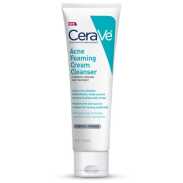Comparison between Bioderma Sebium Foaming Gel vs. CeraVe Acne Foaming Cleanser
Find out which product is better for your skin.
Ingredients in both products 4
Components only in Bioderma Sebium Foaming Gel 17
Sodium Cocoamphoacetate, Sodium Laureth Sulfate, Methylpropanediol, Disodium EDTA, Mannitol and 12 more.
Uniqueness: 81.0%
Components only in CeraVe Acne Foaming Cleanser 24
Benzoyl Peroxide, Glycerin, Cocamidopropyl Hydroxysultaine, Sodium C14-16 Olefin Sulfonate, Xanthan Gum and 19 more.
Uniqueness: 85.7%
Face to Face
Components position by position
1
Water
1
Benzoyl Peroxide
2
Sodium Cocoamphoacetate
2
Water
3
Sodium Laureth Sulfate
3
Glycerin
4
Methylpropanediol
4
Propylene Glycol
5
Disodium EDTA
5
Cocamidopropyl Hydroxysultaine
6
Mannitol
6
Sodium C14-16 Olefin Sulfonate
7
Xylitol
7
Xanthan Gum
8
Rhamnose
8
Potassium Hydroxide
-- Show others --
Positive Effects
Find out what good effects the product has
Both products provide the following effects: Antioxidant, Moisturizing, Cleansing, Acne fighting, Softening, Soothing, Anti-aging, Lightening, Elasticity improvement, Rejuvenation, Antiseptic, Deodorant, Hair structure improvement, Hair growth stimulating
Effects unique for Sebium Foaming Gel:
UV Protection, Healing, Nutrifying, Antifungal, Anticellulite, RegenerationEffects unique for Acne Foaming Cleanser:
Pore Shrinking, Lifting, Antistatic, Protection, Hair conditioning, Hair gloss-- Show more --
ECO Metrics
Find out how eco-friendly the components are
Vegan
No
No
Cruelty free
No
No
Reef friendly
Yes
Yes
Ozone layer safe
Yes
Yes
Organic score
natural
6 out of 21
29%
chemical
12 out of 21
57%
natural
7 out of 28
25%
chemical
17 out of 28
61%
Concerns
Pay attention to these components
-- Extra information --
Components by Skin Type
Find out what components are good or bad for your skin type
Dry skin
Positive: 1Negative: 1
Propylene Glycol#18Sodium Laureth Sulfate#3
Oily skin
Positive: 0Negative: 0
Sensitive skin
Positive: 0Negative: 1
Lactic Acid#14
Dry skin
Positive: 3Negative: 1
Glycerin#3Propylene Glycol#4Sodium Hyaluronate#17Benzoyl Peroxide#1
Oily skin
Positive: 1Negative: 0
Glycolic Acid#14
Sensitive skin
Positive: 0Negative: 3
Glycolic Acid#14Citric Acid#23Benzoic Acid#28
Detailed view
Bioderma Sebium Foaming Gel vs. CeraVe Acne Foaming Cleanser
Position 1
#1Water
Origin: natural
Role: Solvent
EWG Rating [ 1 ]
Water is a great solvent. It’s neutral and doesn’t provide any strong positive or negative effects. It just helps components to mix better and to transport active components.
-- versus --
#1Benzoyl Peroxide (4%)
Origin: chemical
Role: Antiacne agent, Oxidizing agent
Cleansing
Acne fighting
EWG Rating [ 3 ]

Bad for dry skin
Benzoyl Peroxide is very effective against acne. It destroys Propionibacterium acnes - a bacteria that causes this problem. That's why it works so great. It also helps to renew and exfoliate dead cells helping to make the skin cleaner. You can find this component in many anti-acne products.

